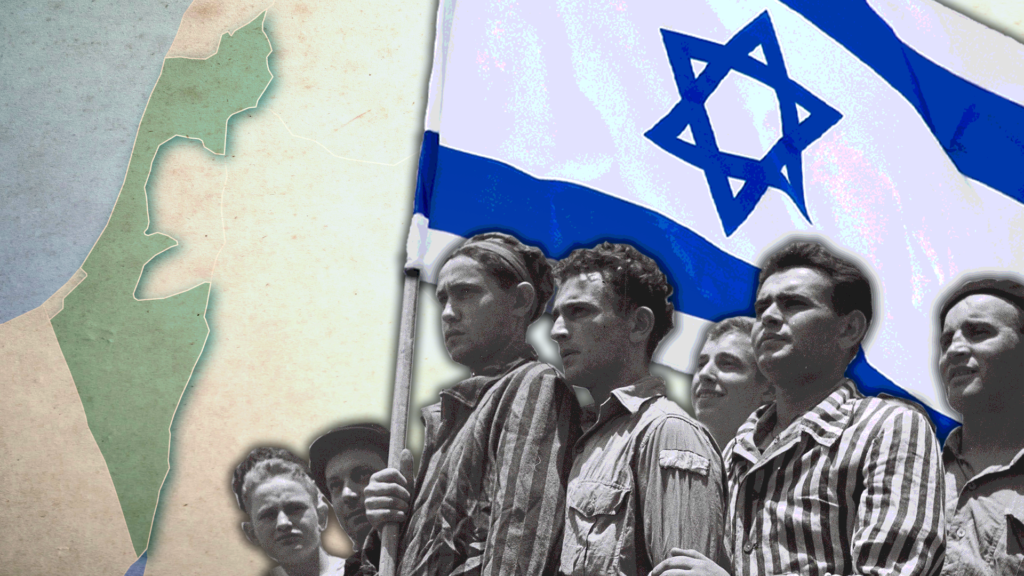When is anti-Zionism anti-semitism?
 Zionism isn’t one thing, and has been attached to a whole range of political worldviews, says David Slucki. : Michael Joiner, 360info CCBY4.0
Zionism isn’t one thing, and has been attached to a whole range of political worldviews, says David Slucki. : Michael Joiner, 360info CCBY4.0
When is anti-Zionism anti-semitism?
Professor David Slucki from the Australian Centre for Jewish Civilisation at Monash University explains how the history of anti-Zionism and anti-semitism is tied to the other, and there isn’t always a clear difference between the two.
Quotes attributable to David Slucki from the Australian Centre for Jewish Civilisation at Monash University:
“Anti-semitism is a historic phenomenon. We call it the oldest hatred because it really goes back to antiquity.
“The way we recognise anti-semitism today. Really, we can trace that back to the kind of early to middle 19th century where this pseudoscience emerges through which really follows the revelations of Charles Darwin on the Origin of Species.
“And Darwin’s principles get misapplied to analysing human beings and humanity. So what we get with the rise of these kind of ideas is the notion that there are inherent traits leading to your racial makeup.
“And it’s nonsense, but it becomes quite popular in certain parts of the world. And so this kind of this modern anti-semitism, which revolves around race science and around Jewish conspiratorial thinking, you know, it brings hatred in all kind of into the modern world. This transforms anti-semitism, and it persists to this day.
“The biggest flash point is the Holocaust. And really those that first half of the 20th century when violence against Jews is almost nonstop.
“Even though in the West anti-Semitism became less acceptable after the Holocaust, it never went away.
“People still have not stopped blaming the Jews for their problems.
“The rise of social media has played a huge role in the spread of anti-Semitism.
“You know, with the rise of YouTube, Twitter, Tik Tok, it’s just much easier to be confronted with anti-semitism. You don’t have to go looking for it.
“Zionism isn’t one thing, and it’s never been one thing that’s been attached to a whole range of political worldviews.
“There was rarely agreement on what that all looks like, whether that took the form of a nation state, which was the most kind of prevalent version of it, but you know, Zionism was one of many political movements in the pre Holocaust Jewish world.
“It wasn’t even the dominant one, but the Holocaust changed things for many Jews. The fact that there was nowhere to go, establishing a Jewish state in what was then Palestine came at a huge cost.
“As Israel developed ,decades of war marked its foundational years and its difficult relationship with its neighbours continues.
“It sparked war with not only Palestinians but also surrounding neighbours. It saw the displacement of hundreds of thousands of Palestinians from their homes, and it’s been an intractable quagmire, I guess.
“So this is kind of in a way unsolvable problem between the notion that only Israel can shore up the Jews’ existence. And if you don’t have a Jewish state, then that leaves Jews vulnerable versus at what cost.
“And I think that’s really the position of many anti-Zionists, that the cost of statehood is too great. And there are people on all different positions along the spectrum.
“Is anti-Zionism antisemitism? It can be. And you know, this is part of the struggle to define anti-Semitism.”
On the International Holocaust Remembrance Alliance antisemitism definition:
“… and that was adopted by countries, by universities, as the definition. And one of the critiques that came out of that was it was a bit too rigid in some ways that it would have a kind of chilling effect on a particular academic freedom of speech.
“You know, we’re in a heightened period right now as well when many Jews in places like Melbourne and Australia more broadly still carry vulnerable and very sensitive to anti-Zionism. And when I say many Jews, I say that because there’s also like a cohort of Jews that identifies anxieties and so on and generalise and say Jews feel this way or another way, again, it’s a spectrum,
“One of the things that’s concerned me locally, you know, obviously I’m very concerned about the unfolding crisis in Israel, in particular in Gaza. But one of the things I’ve been concerned about locally when I look around me is the impact that it has on our social cohesion and our ability to connect with one another and our ability to have difficult conversations. And these are difficult conversations necessarily.
“So, and I think it starts from a place of empathy, you know, and that’s our role at universities also to teach how to teach and model, how to have those discussions.
“So I think it comes from a place of like understanding why people feel the ways in which they do and seeing them as fully human and imperfect.”
Originally published under Creative Commons by 360info™.







